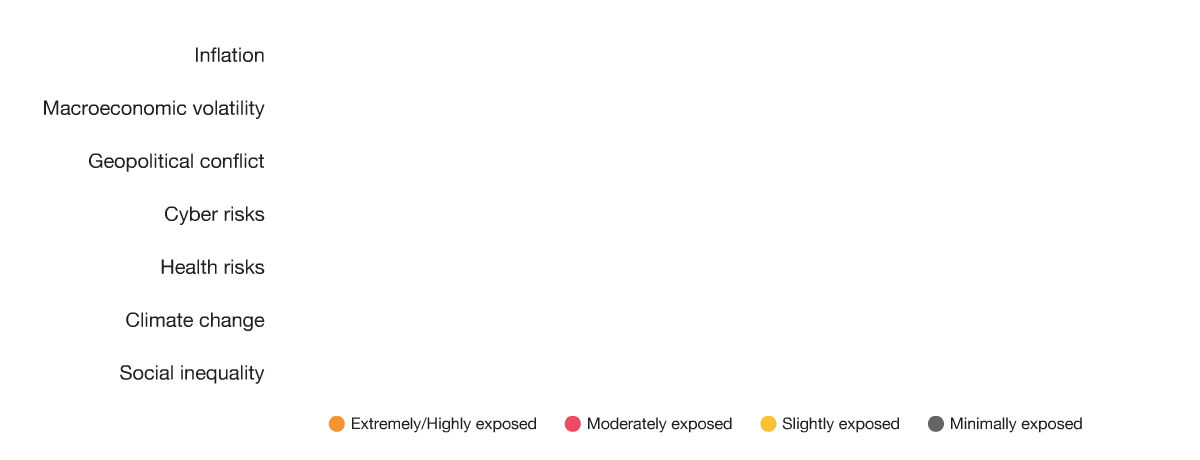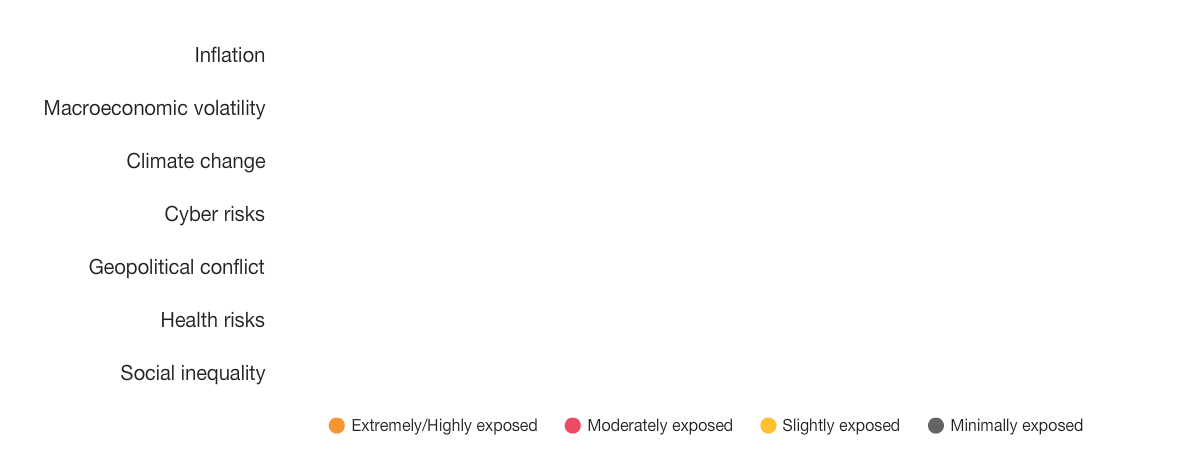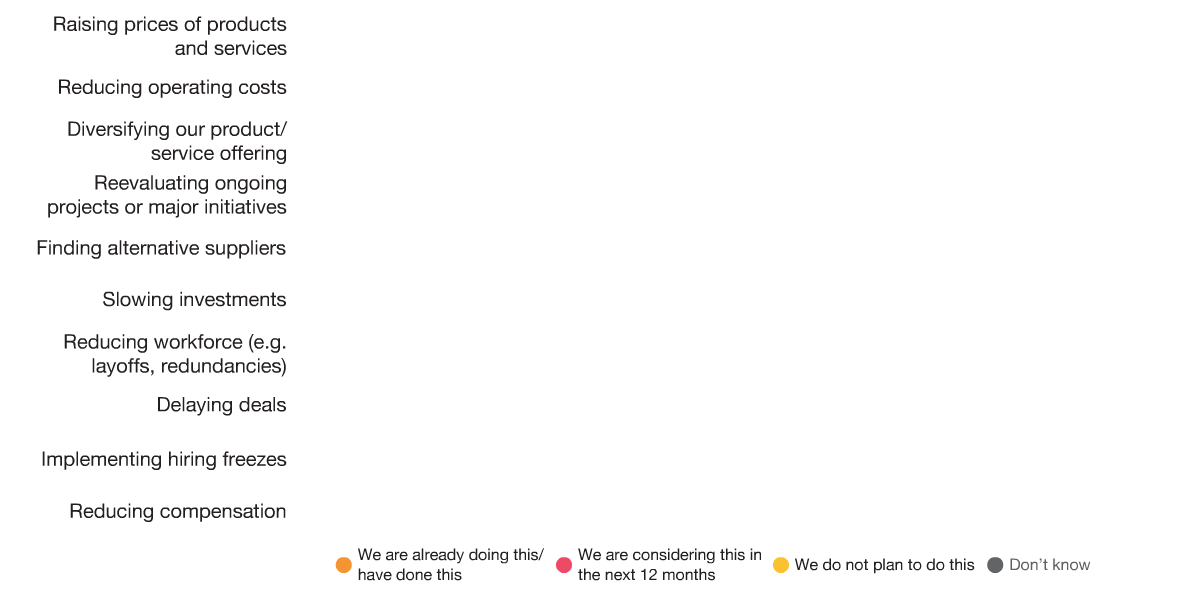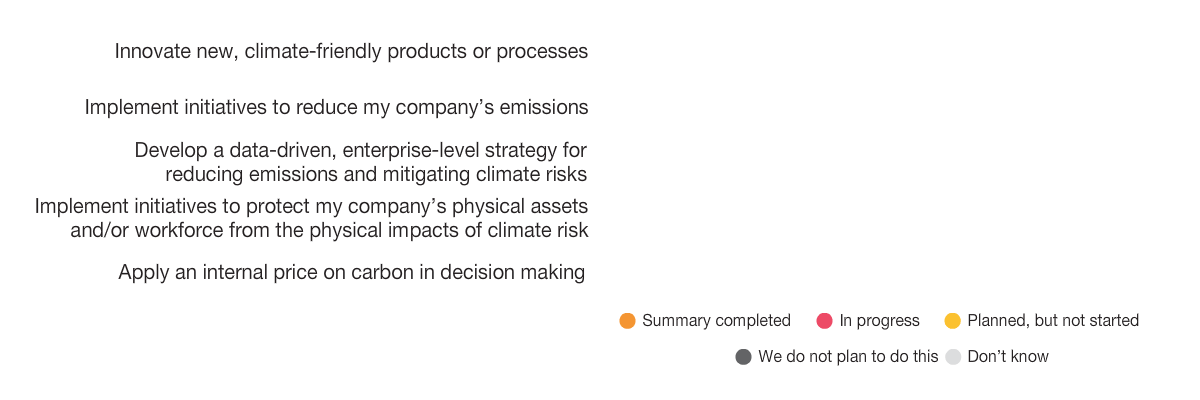{{item.title}}
{{item.text}}

{{item.text}}
“Over the past few years adapting to change and volatility has become a constant and, as we start 2023, this trend continues. Already this year we have seen a change of Prime Minister and the devastating Auckland floods and Cyclone Gabrielle. Ongoing disruption is the new normal.
These events are playing out against a backdrop of immediate issues such as higher inflation, the threat of recession, continued supply chain challenges and labour and skills shortages. We can see from this year’s survey results that these immediate concerns are dominating the CEO agenda as leaders look to drive profitability in the face of numerous headwinds.
With this comes the need to get the right balance, ensuring we also maintain momentum on longer-term issues such as addressing climate risk (with recent climate events in mind), and upskilling employees to best position our businesses for the future. As business leaders we must keep an eye on the horizon and think about how we can continue to transform to thrive. Transformation within our organisations will be key for ensuring they remain prosperous for years to come.
We are calling this balancing act of managing short-term risks and the need for long-term transformation the dual imperative. And, navigating this imperative is complex.
It means CEOs will need to keep drawing on their team’s resilience and adaptability reserves to maintain momentum.
The New Zealand business community has shown huge resilience over recent years and I believe this can give us a sense of optimism about the coming year. We have faced challenging times and adapted. We can do it again.
Thank you to the 142 local business leaders who shared their valuable time and insights for the creation of this year’s CEO survey. I hope you find the report thought provoking and wish all CEOs and their teams a resilient year ahead.”
Mark Averill
CEO and Senior Partner
PwC New Zealand
of NZ CEOs believe global economic growth will decline over the next 12 months. In 2022 64% believed growth would improve
of NZ CEOs believe New Zealand’s economic growth will decline over the next 12 months. In 2022 49% believed growth would improve
of NZ CEOs are confident about their organisation’s revenue growth in the next 12 months compared to 53% in 2022
We asked CEOs for their recommendations for sustainably improving New Zealand’s prosperity. Their responses include:
This year’s results reveal that near-term challenges are front of mind for New Zealand business leaders. Starting with the global economy, 79% of local business leaders think it will contract in the next 12 months – a clear contrast to last year when 64% of New Zealand CEOs thought global economic growth would improve. This level of pessimism is mirrored in the findings related to New Zealand’s economic growth which 76% believe will decline over the next year.
Like CEOs around the world (73% of global CEOs believe global economic growth will decline in the next 12 months), leaders in this country are bracing for a potential recession and continuing high inflation.
The drop off in optimism continues when we look at local CEOs’ confidence in their own organisations’ revenue growth. Thirty nine percent say they are confident about growth in the next 12 months compared to 53% in 2022. CEOs are more optimistic about their three-year revenue growth prospects compared to the shorter term with 54% feeling confident, a drop from 68% last year.
When it comes to where CEOs are feeling most exposed, inflation and macroeconomic volatility top the charts – two headline-grabbing issues that continue to dominate the news. This picture changes slightly over the medium-term (five-year) outlook with climate change and cyber risks moving up the table.
In response to the economic challenges, CEOs are taking action to reduce costs and drive growth including raising prices and diversifying products and services. Similarly, they are re-evaluating the need for major projects and initiatives. The results show that the majority are not considering implementing hiring freezes, or reducing their workforce or compensation.
“If the survey was carried out now rather than in October and November last year I think we might see less pessimism about a decline in both global and New Zealand economic growth. Around the time of the survey, interest rates were rising, inflation was increasing and the Reserve Bank of New Zealand was forecasting a recession.
I believe that was peak uncertainty. What we’re now seeing is inflation starting to stabilise and trend lower. Interest rate markets are starting to price in rate cuts globally, despite protests from central bankers who maintain a view to keeping interest rates higher for longer.
Recent weather events will challenge the short-term inflation outlook in New Zealand. A near term inflation spike is likely with further supply disruptions, higher food prices and a surge in construction material pricing. Insurers will no doubt be looking to recover losses through higher premiums also. The immediate impact on GDP growth will be lower before re-insurance monies and the eventual rebuild supports a higher growth path than previously anticipated.”
“A more positive outlook should give CEOs more confidence although the impact of high interest rates is still going to be felt by their customers – particularly in the first half of 2023 when a significant amount of interest rate refixing starts for residential mortgage holders.
This will affect the amount of money people have to spend and we’re seeing that already with consumer spending starting to moderate. In the latest inflation data the two biggest contributors were food prices and household related costs like increasing rents.”
“We’re still seeing an incredibly tight labour market with the latest unemployment numbers only rising slightly. We need a little more slack in the labour market, an upswing in immigration and more competition for jobs. These factors will temper the wage price spiral that’s feeding into inflation.”
“When we look at key sectors in the New Zealand economy, tourism is rebounding from the struggles of the last three years in a big way. I’d expect that trend to continue particularly into the latter part of this year with China reopening (something that also happened post the survey being carried out).
There has been moderation in energy prices recently with fuel and petrol prices reducing. Likewise, freight and shipping costs are materially decreasing and are now approaching pre-COVID levels. We’ve also seen the New Zealand dollar strengthen, reducing costs to importers.
There are reasons to believe the most pessimistic period is over and we can be more certain about what the worst-case scenario might be. So, even if we do head into a recession in the next couple of quarters, things will likely pick up again after that.
While some sectors, like retail and hospitality, face challenges, we’ve seen over the COVID period that New Zealand businesses are resilient and able to pivot quickly.”
Alex Wondergem
Partner
PwC New Zealand
For more information about the global economy read PwC’s Global Economy Watch.
How exposed do you believe your company will be to the following key threats in the next 12 months?

How exposed do you believe your company will be to the following key threats in the next five years?

Which of the following options best describes any action your company may be considering to mitigate against potential economic challenges and volatility in the next 12 months?

The survey results show that New Zealand CEOs are focused on investing in technology to transform their businesses and ensure long-term growth and prosperity.
We find that 84% of local business leaders are investing in automating processes and systems over the next year (compared to 76% of global CEOs and 71% in Asia Pacific) while 76% are deploying technology such as the cloud, AI and others (compared to 69% of global CEOs and 67% in Asia Pacific). These investments will play a vital role in helping organisations deal with the challenges they currently face and deliver long-term value.
When it comes to technology, the majority of business leaders are making investments with an emphasis on reinventing, rather than just maintaining, their current business (63% compared to 37%).
These findings reveal that accelerating digital transformation is vital for ensuring long-term viability and growth. The pace of change continues to increase and that means significant interventions will be needed both now and in the future to enable businesses to succeed.
of NZ CEOs are investing in automating processes and systems over the next year
“Transformation is a necessity for businesses to stay relevant and competitive in today’s rapidly evolving and interconnected digital economy. Nearly every organisation is feeling the need to revolutionise their ways of working to ensure they remain viable into the future. At the same time, human insight and experience remains central to any transformation project. Having the right team in place, who understand the role of technology in an organisation will lead to a more streamlined approach to delivering results.”
Rob Fisher
Technology Consulting Lead Partner
PwC New Zealand
“Investments in Automation, Cloud and AI are going to provide insights which will undoubtedly change the competitive landscape. Transformation programmes should seek to enable a technology ecosystem with data and AI at its core. This allows organisations to learn and adapt in an agile and scalable manner to better understand their customer, evolve their products and services and do more than merely staying ahead of the competition.
Business leaders should be asking if their transformation programmes are doing more than just modernising existing technology capabilities with predefined improvements, or are they leveraging the right blend of cloud based solutions that can allow for an accelerated and flexible path to unlocking adaptive business value?”
Nevena Pejanovic
Partner, Data Transformation
PwC New Zealand
For more insights on business transformation solutions read PwC’s global research here.
The research reveals that 27% of New Zealand CEOs believe their business will not be economically viable in less than 10 years. While this is considerably less than their global (39%) and Asia Pacific (53%) counterparts, there is a clear need for leaders to balance their immediate concerns about inflation and economic volatility with reinventing their businesses for the future.
When asked about the forces most likely to impact their company’s profitability in the next 10 years, 54% of local CEOs pointed to labour and skills shortages. CEOs’ recent experience with the so-called ‘great resignation’, talent travelling again after the New Zealand border reopened and a downturn in migration, are clearly front of mind and the war for talent remains fierce.
To help mitigate the concerns and drive long-term transformation, New Zealand CEOs are focusing on talent and technology. Eighty six percent are investing in upskilling their workforce in the next year.
We also asked local business leaders about the actions they are planning to take in the next 12 months to drive the productivity of their workforce. Developing leadership and talent came out on top at 92% followed by upskilling and reskilling employees at 83%.
These are initiatives New Zealanders want to embrace. In PwC’s Global Hopes and Fears survey, 77% of New Zealand respondents noted they were ready to learn new skills and retrain.
“We can expect to see labour and skills shortages for some time so business leaders need to invest both in talent and technology. There is an opportunity for CEOs to think about how they can best use tech like automation alongside their employees to ease the pressure and drive longer-term transformation. This isn’t about automating roles but particular tasks that free employees up to do more meaningful, skilled work.
There are some key questions for leaders to be thinking about – how can technology be used to make the most of the skills their people already have? And, how can it be used to create extra capacity for employees to focus on more high-value work?”
“Over the last few years we’ve seen the employer/employee relationship change from something transactional to something more like a relationship of equals. Part of this new relationship involves the need for executives to have open and honest conversations about their aspirations for their staff, what building a career in their organisation looks like and how they will be supported through upskilling or reskilling. It’s important for employees to know that CEOs want them to stay in their roles, grow and succeed.
With any approach to upskilling there needs to be a change management process in place so people understand the long-term vision for the organisation and feel supported.”
“People now expect to have a different work life and are feeling more in control of how and where they are employed. We’re seeing more people leave full-time employment and embrace contracting roles or remote or part-time work.
Because of this, and to help mitigate more churn in their workforces, CEOs need to think about how they can attract and retain people who have different work constructs and patterns.”
Griere Cox
Partner
PwC New Zealand
For more ideas about creating a future-fit workforce read our report Building prosperity: a pathway to wellbeing for all of Aotearoa.
of NZ CEOs say labour and skills shortages could have a large impact on their company’s profitability over the next 10 years
of NZ CEOs are investing in upskilling their company’s workforce in the next year
of NZ CEOs are planning to develop leadership and talent in the next 12 months to drive the productivity of their workforce
Which of the following investments, if any, is your company making in the next 12 months?
The results for this latest CEO Survey were collected before the Auckland floods and Cyclone Gabrielle. They show that in October and November 2022 New Zealand CEOs were more focused on the economic environment. Inflation and macroeconomic volatility dominate the list of perceived threats to business with only 8% feeling extremely or highly exposed to climate change.
It also shows that CEOs expect some degree of impact from climate change in the next 12 months. This is mostly in their cost profiles where over 50% expect a moderate, large or very large impact followed by supply chains (33%) and physical assets (12%).
When asked about the actions their company has taken to prepare for climate risk, the focus is firmly on implementing initiatives, innovating products and processes and developing a strategy. Applying an internal price on carbon in decision making languishes at the bottom of the table with 61% saying they have no plan to do it.
The impact of the Auckland floods and Cyclone Gabrielle will likely affect next year’s survey results as businesses work through the aftermath. This event illustrates the pressing need for businesses to transform their approach to climate risk as focusing on mitigation alone will not adequately prepare them for the future.
“CEOs may be prioritising economic challenges over climate risk, but with climate-related disclosures here, companies must face into it. Until now, businesses could decide whether or not to factor climate risks and opportunities into strategic decision making, but the regulation is forcing many companies to act – they need to demonstrate considerations of climate change or have an explanation for why they are not.
For those not impacted by regulation, the momentum already driving decision making in markets, both locally and internationally, means they will have to address climate risk. It means repositioning their businesses to stay relevant to consumers and adapting to the physical and transition risks of climate change ahead of them happening.”
“Companies need to understand the importance of factoring an internal price on carbon into their business decision making. If you’re not thinking about climate risk in terms of the costs to your business in the future, it means you’re not thinking about long-term risk. This is where carbon pricing comes in because it is linked to the future cost of climate risk on a business. The insights provided by an internal pricing mechanism for carbon are essential for organisations to adequately anticipate and manage the risks of the transition to a zero carbon economy.”
Annabell Chartres
Sustainability and Climate Change Leader
PwC New Zealand
More insights from our Sustainability and Climate Change team can be found here.
To what extent do you expect the following areas of your business to be impacted by climate risk in the next 12 months?

What actions has your company taken to prepare for the risks?

Our global strategy reflects fundamental changes in the operating environment faced by our clients and stakeholders, including technological disruption, climate change and fractured geopolitics.
Our community of solvers is dedicated to solving the complex problems businesses are facing in today’s changing marketplace, helping organisations and individuals create the value they’re looking for. As part of a global network of firms in 155 countries with more than 327,000 people, we are committed to delivering quality in assurance, tax and advisory services.
Our experienced Treasury Advisory team provides independent, clear, pragmatic and impartial advice to clients on all aspects of treasury and debt management. Whether that involves hedging policies for foreign exchange, interest rate and commodity price risk, or designing and implementing strategies for securing optimal debt funding arrangements for borrowers.
PwC is a key strategic transformation provider to leading private and public sector organisations across Aotearoa. We have assisted the country’s most prominent businesses in bringing about the largest technology change programmes ever seen. We understand that success depends on working closely with the organisation to define, develop and deliver innovative technology strategies that are closely aligned to the organisation’s business strategy and goals.
Our people advisory offering combines organisational strategists, Human Resource (HR) practitioners, employment lawyers, regulatory, tax, and technology specialists who work together to help you improve organisational performance and employment relations, deliver sustained outcomes for your business and unleash the potential of your people.
We advise clients across New Zealand on a range of sustainability initiatives, carbon reduction strategies and reporting. Our team includes leading specialists in sectors that are at the forefront of the transition to a renewable future, including the energy, transportation, agriculture, and the digital sectors.
{{item.text}}

{{item.text}}
Mark Averill
























